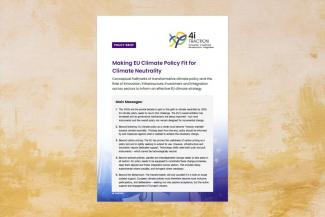
Citation:
4i-TRACTION (2022): Making EU Climate Policy Fit for Climate Neutrality. 4i-TRACTION Policy Brief. Ecologic Institute, Berlin.
Making EU Climate Policy Fit for Climate Neutrality
How must EU climate policymaking evolve to become transformative? This policy brief sets out conceptual hallmarks required for attaining climate neutrality in the EU.
Main Messages
- The 2020s are the pivotal decade to get on the path to climate neutrality by 2050. EU climate policy needs to rise to this challenge. The EU’s overall ambition has increased and its governance mechanisms are being improved – but most instruments and the overall policy mix remain designed for incremental change.
- Beyond tinkering: EU climate policy as a whole must become “mission oriented” towards climate neutrality. Thinking back from the end, policy should be informed by and measured against what is needed to achieve the necessary change.
- Beyond carbon pricing: The EU has proven the usefulness of carbon pricing as a policy tool and is rightly seeking to extend its use. However, infrastructure and innovation require dedicated support. Technology shifts need both push and pull instruments – which cannot all be technologically neutral.
- Beyond sectoral policies: parallel and interdependent change needs to take place in all sectors. EU policy needs to be equipped to coordinate these change processes, keep them aligned and foster integration across sectors. This includes being experimental where possible, and stringent where necessary.
- Beyond the Berlaymont: The transformation will only succeed if it is built on broad societal support. European climate policies must therefore become more inclusive, participatory, and deliberative – seeking not only passive acceptance, but the active support and engagement of Europe’s citizens.